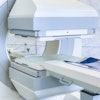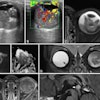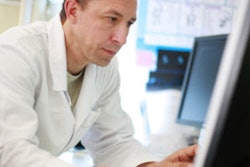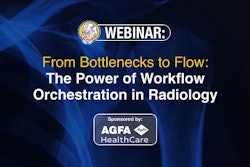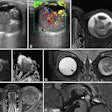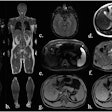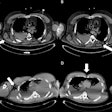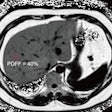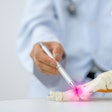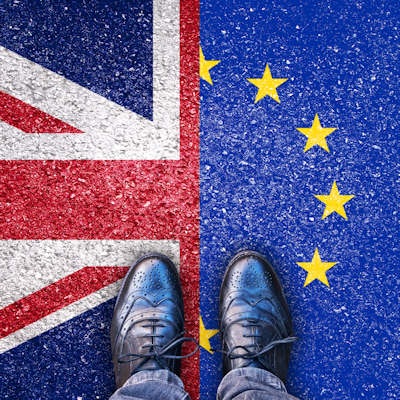
As the 29 March deadline for the U.K.'s planned departure from the European Union (EU) draws ever closer, some EU citizens working in the U.K.'s medical imaging sector are taking steps to bolster their positions, while others have decided to leave and find work in other countries.
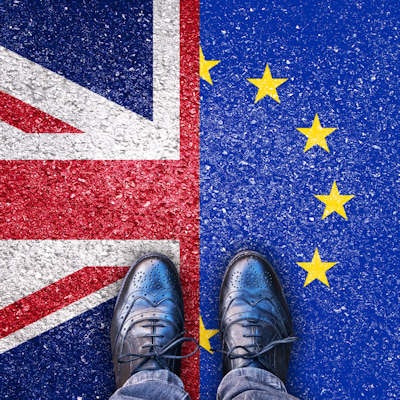
From anecdotal and some statistical evidence, it seems that Brexit has already had an impact on the numbers of young radiology staff considering the U.K. as a destination for training and practice, but what factors have kept some on British soil while others have gone?
A senior radiologist who wished to remain anonymous has now left the U.K. for France, and she explained what drove her and her husband to make this radical decision. While she felt a part of the radiology team in her department, she believes that the actions and statements of some politicians and journalists have helped to create a hostile environment for foreigners, making them feel less welcome in the U.K. since the Brexit discussions started in 2016.
"I feel very strongly European, and the fact that Britain voted to leave the EU shocked us deeply," she told AuntMinnieEurope.com. "Many parents at my children's school in the U.K. expressed their deep concerns and voted against Brexit; however, I know that even in my department, many people voted to leave the EU."
She and her husband also had negative personal experiences during the period of the Brexit discussions, which reinforced their decision to go. Believing her to be British, one patient told her, "It was so nice not to have been scanned by a foreign doctor," while her husband was twice verbally abused and threatened because of his left-hand drive car and his accent.
Harm to patients
"I worked with my European passport in the U.K. for so long and never considered having to justify my residency or the need for a work permit. I was also involved for some time in data collection for the Royal College of Radiologists (RCR) yearly workforce and workload census, and I know the figures: Britain desperately needs radiologists," she noted. "Anything this government has done to discourage radiologists or other health workers from coming, or worse, to make people want to leave, will ultimately harm patients. However, I do not see that there is any awareness in this respect."
She stressed that if Brexit hadn't happened she wouldn't have started looking for another job abroad, but that once on the case, she discovered that job opportunities elsewhere were excellent. She and her family don't regret leaving, she noted, particularly given the daily news that reveals so many legal uncertainties for remaining EU nationals and their children, which U.K. politicians seem unable to resolve in a constructive way.
"Starting to work in French was certainly a challenge in the beginning, but my colleagues here were very encouraging. Progress was quite fast, and now I am well-settled," she noted. "Our children have great opportunities, with many schools here offering bilingual classes. Public schools of excellent quality are certainly a big bonus of living here."
Dr. Francesco Fraioli, a consultant radiologist at University College London Hospitals (UCLH) National Health Service (NHS) Foundation Trust since 2012, had reassurances from his institute about working in the U.K. after Brexit. He has dual accreditation in radiology and nuclear medicine, and when he applied for settlement status, it was granted without a hitch. He noticed that recruitment has changed but is not sure how much of this is due to Brexit and how much is due to new recruitment rules with regard to English language skills.
"So far the NHS and UCLH have made all possible efforts to preserve EU grants and open collaborations, and I strongly believe that, in terms of research, nothing will change too much," he said.
Residency threat
Fellow Italian Dr. Filippo Pesapane -- the Radiology Rising Star in the 2019 EuroMinnies -- is not quite so optimistic. He came to study as a radiology resident in September 2018 as part of his residency in radiology with the University of Milan.
He undertook training in Belgium, the U.S., and the U.K. with a scholarship from the European School of Radiology. In September, he joined King's College Hospital NHS Foundation Trust in London, and then moved to the Royal Marsden NHS Foundation Trust in Sutton in January. He'll stay there until May and then will return to Italy to complete his training and qualify as a radiologist in December.
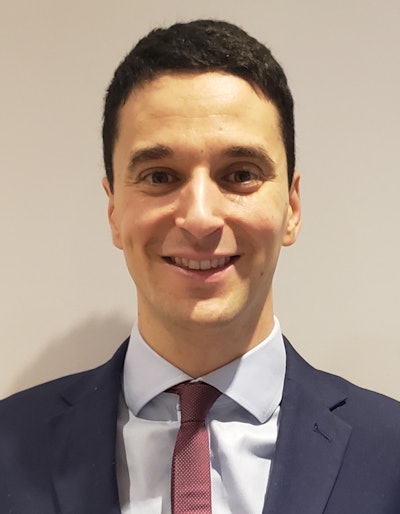 Dr. Filippo Pesapane from the University of Milan in Italy.
Dr. Filippo Pesapane from the University of Milan in Italy.His fiancée who moved to the U.K. several years before him to study law has been in the country for more than five years and will be able to stay. Before the Brexit referendum, it had been Pesapane's intention to make a life with her in the U.K. once he had qualified, but now he is not sure that it will be possible.
"The NHS needs physicians, in fact there is high demand. Several consultants have said that their hospital needs radiologists and that there would be a job for me if I stayed, but the fact is that I don't want to be a 'guest.' While Britain was in the EU, I didn't feel like a guest, but that I had a real right to be there. Since the vote, I haven't felt comfortable, and sense the undercurrent of racism and suspicion toward foreigners," he explained.
Most of the people he works with or encounters as patients are openly against Brexit, but some see him as a foreign doctor, and although his spoken English is of a high level, they get impatient with him when he doesn't understand straight away what those speaking very quickly or with heavy accents say.
"If they get the impression that there is or will be a language barrier, they question whether I will be able to treat them accurately," he noted.
Despite an element of patient suspicion, he loves the type of radiology that residents can experience here in the U.K. Pesapane came to London to access different courses and undertake research in radiomics in a multicenter study network. His workload is 60% research and 40% clinical, the latter predominantly in breast imaging and whole-body oncological MRI.
"The main difference is that you can decide what type of radiology you want to do and subspecialize accordingly. In Italy, there is less flexibility and fewer opportunities -- you have to adapt to what the hospital wants," he said.
Other Italian radiologists that he knows are now in stable positions as consultants, and they will stay in the U.K., according to Pesapane. However, the situation is not so clear-cut for residents. Some of his Italian friends who came to London to study finance and architecture have returned to Italy in the last two years.
"It is the young, not the old, who will be penalized by Brexit," he noted. "Young Italians come to the U.K. to find steady work as in Italy there is less job stability. If this disappears with Brexit, then there is no reason to come or stay."
For now, Pesapane's future is uncertain, and he isn't counting on being able to live in the U.K.
"If Brexit wasn't happening I would stay on and find work, but I will probably end up working in Italy -- after all, Italy needs radiologists too," he noted.
Total support
Dr. Elisabetta Giannotti, a consultant breast radiologist at Nottingham University Hospital and a member of the AuntMinnieEurope.com Editorial Advisory Board, feels supported at all levels.
"I had faith that the government and the NHS would support overseas doctors. A year ago, the RCR met with the prime minister to lobby for protection of European radiologists working in the U.K. This made us feel very welcome and looked after. Furthermore, my own hospital sent an email to all European employees to say that the institute valued our presence and would protect us."
Her colleagues have always been very supportive and positive that the government will find a deal, she noted.
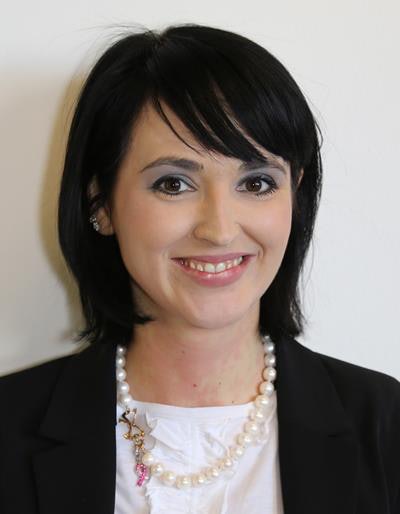 Dr. Elisabetta Giannotti. Photo by Christof. G. Pelz.
Dr. Elisabetta Giannotti. Photo by Christof. G. Pelz."Brexit is creating uncertainty for European doctors and British citizens alike. From my point of view, I am sure that a deal will be found to guarantee that people who are working and paying taxes can stay and benefit from the welfare system," she said. "Brexit should not prevent European healthcare staff from coming to work in Britain. They are needed on this island!"
As she has been in the U.K. for three years not five, Giannotti could only apply for presettled status, rather than settled status. She took part in a pilot study conducted across some healthcare trusts and higher education establishments so that she could apply for her status before the system opened to the public.
"The process was really easy, and I got a positive response in a couple of days," she noted.
EU citizens and their families will be able to apply to the EU Settlement Scheme to continue living in the U.K. after 30 June 2021. If an application is successful, the applicant will get either settled or presettled status. The EU Settlement Scheme will open fully by 30 March 2019; however, some EU citizens may be able to apply now if they meet the criteria. The deadline for applying is 30 June 2021.
Giannotti explained that applicants can get settled status if they have started living in the U.K. by 31 December 2020, have lived there for a continuous residence over a five-year period, specifically meaning that they have been in the U.K. for six months in any 12-month period for five years in a row. If applicants obtain settled status, they can stay in the U.K. for as long as they like. With such status, EU citizens can, if eligible, apply for British citizenship, work in the U.K., use the NHS, enroll in education or continue studying, access public funds such as benefits and pensions if eligible, and travel in and out of the U.K.
If, like Giannotti, applicants have fewer than five years of continuous residence, they can obtain presettled status, which allows them to remain in the U.K. for a further five years from the date of receiving this status, but they must apply again to get settled status if they want to stay for longer than that. European radiologists who arrive before December 2020 can apply for presettled status. After that, they will probably need visas, unless a different deal is found.
In addition, those wishing to change their status from presettled to settled can apply as soon as they have five years of continuous residence. After April 2019, the process will be free. It is important to note that once EU citizens have obtained presettled status, they can spend up to two years in a row outside of the U.K. without losing their presettled status, but those wishing to change to settled status will need to maintain continuous residence if they want to qualify. Children born in the U.K. to a parent with presettled status also will be automatically eligible for presettled status. They will only be a U.K. citizen if they qualify for it through their other parent.
Recruitment crisis?
Recruiting radiologists from European countries is now becoming difficult, according to Colin Ross, radiology site manager at Leicester Royal Infirmary.
"I gather that U.K. trusts have been tending to stay away from recruiting in the EU recently, and other countries such as Germany have been filling the void," he noted. "We have been recruiting in Portugal and Italy around every six months for the last three years. Our last round in November was the first time our agent had difficulty filling the interviews."
He was able to take a letter from the home secretary with him to Portugal that stated that EU-trained radiographers would still be able to begin work in the U.K. and apply for Health and Care Professions Council (HCPC) registration in the usual way, as long as they are in the country before Brexit happens. He added that he had managed to recruit 13 whole-time equivalent band 5 radiographers, who all began work in February.
